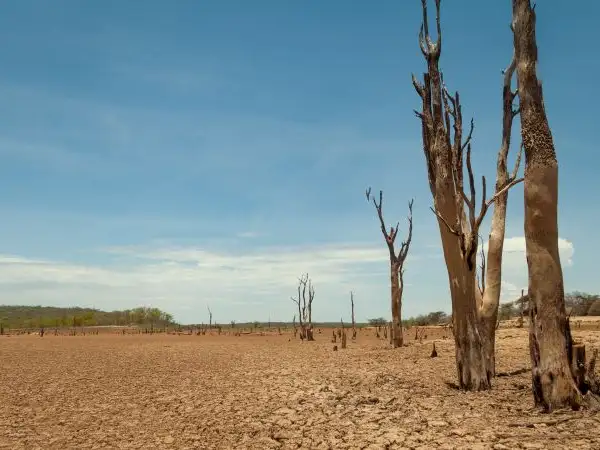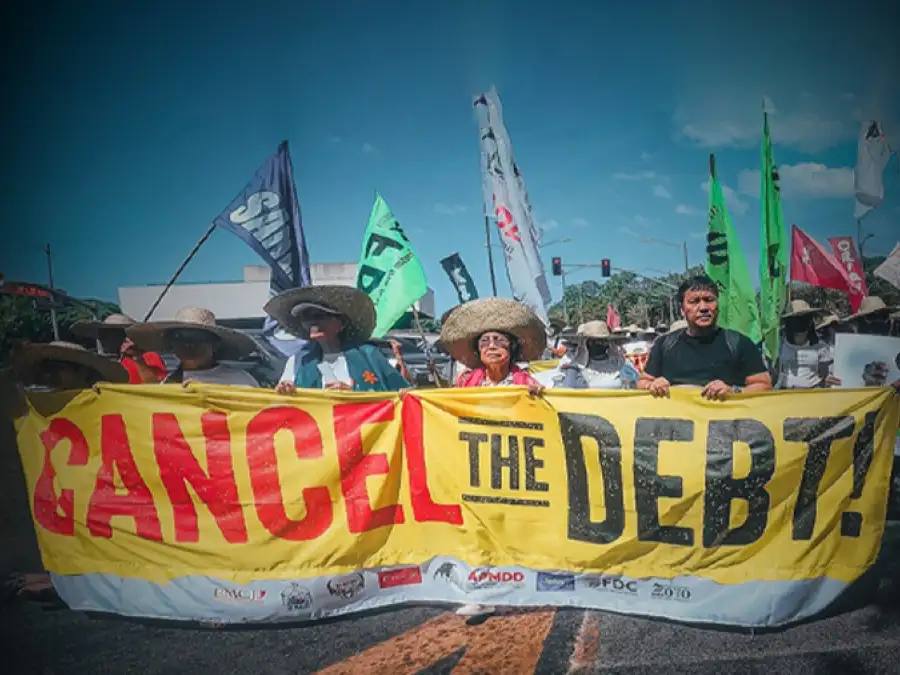

A parched landscape in Zimbabwe's Binga district. Photo credit: Charmaine Chitate
Why does CAFOD want to cancel the debt?
In 2018, low- and middle-income countries owed a total of $7.8 trillion in debt to other countries and institutions like the World Bank, as well as private banks and hedge funds.
These countries often have to spend more on paying back their debts than on healthcare, education or welfare.
And at the start of 2020, 34 countries were in debt default (not being able to pay off their debts) or at high risk of being so.
How is debt impacting lower-income countries?
Attention is often paid to the needs of the 77 poorest nations. CAFOD believes that debt relief needs to go further to include all low- and middle-income countries that are struggling with debt payments so that they can meet the urgent needs of their citizens
For example, Ghana – with a population of 29 million people – was in deep debt distress even before Covid-19 hit. Ghana is due to spend $3.8bn on external debt payments in 2020. It is currently spending almost four times more on servicing its external debt than it is on public healthcare for its people.
Likewise, in Central African Republic – where there are only three ventilators in a country of almost five million people – the country is due to spend $25 million on external debt payments in 2020.
What is CAFOD asking for?
We are calling for debt payments to be cancelled immediately for all countries that need it until the end of 2021.
This must include all low- and middle-income countries in such need, going beyond the 77 poorest nations already identified by the G20 as being eligible for debt relief
Debt cancellation should not be seen as a question of mercy or forgiveness, but as a question of justice and survival.
What does coronavirus have to do with it?
Coronavirus is having terrible economic consequences across the world – our own country is no stranger to this.
But many countries have been plunged into a new debt crisis as they respond to the threat of the virus whilst also being under pressure to pay back spiralling debts.
Deciding whether to spend money on vital healthcare or paying back debt during the coronavirus emergency shouldn’t have to be a choice for these governments.
What is the history of debt?
After the 2008 financial crisis, low interest rates in western countries meant banks and other lenders looked to lend money to lower-income countries in search of higher returns. Developing country government debt payments increased by 85 per cent between 2010 and 2018.
Throughout the 1980s, 1990s and into the 2000s, many developing countries were caught in a debt trap, where unpayable debts held back progress in tackling poverty and inequality.
Colonialism has also played a role. The colonial economy pushed many countries into a reliance on exports of goods such as cocoa or coffee, which has continued to this date as they continue to depend on supplying raw material products instead of building strong and resilient diversified economies.
Who do lower-income countries owe money to?
These countries owe money to three types of lenders:
1) Other countries (bilateral debt)
2) Institutions such as the World Bank and the International Monetary Fund (multilateral debt)
3) Private banks and hedge funds (private lenders).
What is the current situation?
Campaigners from across the world successfully urged world leaders to cancel billions of pounds of debts for the world’s poorest nations. The Heavily Indebted Poor Countries Initiative (HIPC) and the Multilateral Debt Relief Initiative cancelled $130 billion of debt for 36 countries between 1998 and 2010.
But by the start of 2020, many countries are back in debt distress – including many that were covered by these earlier initiatives. That is because fundamental problems were not solved.
What recent progress has been made?
The IMF has already agreed to cancel debt payments owed to it for six months for around 25 of the poorest countries – saving an estimated $215 million.
But the international community is not meeting the scale of the crisis. To date, just over 70 developing countries have been offered the opportunity to suspend debt payments to other countries for a few months (which could save an estimated $12 billion).
While this is a positive step it still doesn’t go far enough as it simply delays a deeper debt crisis to a few years’ time and does not cover the debts they owe the World Bank or private creditors like hedge funds.
What does Pope Francis say about it?
Pope Francis has spoken out on the injustice of debt, saying: “It cannot be expected that the debts which have been contracted should be paid at the price of unbearable sacrifices. In such cases it is necessary to find… ways to lighten, defer or even cancel the debt.
How should the UK government respond?
The role of private creditors should be addressed. Private creditors must also cancel debt payments due in 2020 and 2021. If this doesn’t happen, the money which is freed up by the cancellation of some debts risks simply being used to pay off private banks and hedge funds.
The UK must pass new legislation, like it did in 2010, to prevent poor countries from being sued by private lenders for defaulting on debt in the UK. An estimated 90 per cent of bonds for the 70 or so countries covered under the G20’s suspension initiative are governed by English law.

Call for debt justice in the Jubilee Year
In the Jubilee Year 2025, people across the world are uniting in solidarity to demand action on the global debt crisis.

